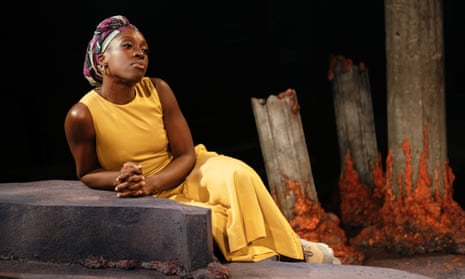Ronkẹ Adékoluẹjo is luminous in Benedict Lombe’s passionate memoir-monologue that weaves lyrical storytelling with untiring protest. When our protagonist – Lombe herself – has to renew her British passport, she uncovers a story of quiet rebellion, recounting her parents’ refusal to settle where violence roams. Through empire, war and hostility, this one-woman show spans continents, taking us from Mobutu’s Congo via post-apartheid South Africa to modern-day London.
Adékoluẹjo is a dazzling, captivating storyteller and joyous dancer. Under Anthony Simpson-Pike’s direction, she controls the stage with such ease, oozing charm and confidence. As she unravels the story, she brings alive the people around her with tenderness and care, giving her mother an air of ancient wisdom and her partner a laid-back solidity. Lombe’s words are told with pleasure and woven with sharp bites of comedy.
Under the bright joy of Adékoluẹjo’s performance, fury rumbles in Lombe’s text. When she recounts experiencing racism as a child, she now has the words to describe it that she didn’t have as a 10-year-old. With hindsight, she takes us through incidents and aggressions from her life, each one being pushed into the pit of her stomach, gnawing at her, getting heavier as she carries the cumulative weight. As the pain becomes physical, Lombe draws attention to systemic medical racism against Black women.
The rising heat of anger and exhaustion erupts as the play steps outside itself, and Lombe’s film Do You Hear Us Now? is projected on to the back of the stage. Made during the pandemic and in the heart of Black Lives Matter protests, the film criticises the idea that Black pain should have to be made “articulate, insightful and poetic” and explores how white people, the overwhelming majority of theatre critics, write about that pain. It is a demonstration both of Lombe’s and Adékoluẹjo’s skill that the show can encompass light comedy with heavy truths.
Lava is at the Bush theatre, London, until 7 August
